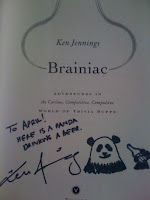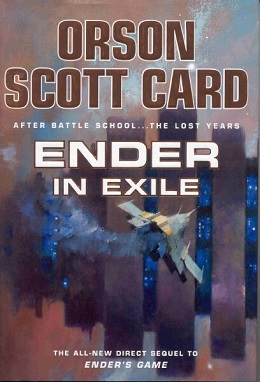Admittedly, I think this book was written for middle school students, but I found the content of the book to be very valuable, especially as a teacher of young urban folks. I related to the main character to some extent because she is a young, Asian immigrant girl who comes to the States as an elementary school student. It is similar to Fifth Chinese Daughter in this sense, but GiT is a fiction rather than a memoir or autobiography. It's beautifully written and insightful -- finally, a mainstream book not written in the All-American Boy in his Rite of Passage or Vain White Girl torn between Fashion, Frenemies, and Frat Boys perspective. This is one of those books where every other page is dog-eared to mark a beautiful quote for later reference. It's a quick read. I recommend it for a lazy summer day.
Brainiac
It seems really silly to read a book about trivia.. especially when you don't care much about trivia at all. You know. Because it's trivial. Hardy har har. This book is written by Ken Jennings, Jeapordy! champion. It's a mix between his life as a J! contestant and about the history and living history of trivia itself. He also throws in all kinds of trivia that I could rarely answer and have already forgotten.
One take away from this book is that it can be helpful to know "a little about a lot" in situations where you are meeting new people or trying to connect with someone whom you may otherwise have nothing in common with.
My second takeaway is that J! trivia is so culturally loaded that fact recall is but a tiny sliver of what it takes to be a contestant on J! You also need to have grown up watching J!, hearing titles of and authors of Western classics (though it is not necessary that you actually read any), and following American sports. Otherwise, you're S.O.L.
Lastly, bits of knowledge have the potential of being so interconnected and laden with satellite bits of knowledge, that memorizing something as small as the order of U.S. presidents (potentially a feat about as easy as memorizing all 50 states in alphabetical order, aka a 5th grade lesson) leads to tapping into an understanding of cause-and-effect, particularly in world politics and world history.
Little Bee
I'm a little addicted to books that take place in the Middle East and more so addicted to books that take place in Africa. I'm a bit ashamed of this fact because I don't mean to exoticize another culture for even a minute. I simply want to learn more about the other side of the world via an outlet other than NPR and sensationalized media outlets that feed nothing but clipped, chopped soundbites.
Little Bee was horrific and heartbreaking to say the least. It was another pageturner. I admit, I'm so ignorant of the politics it spoke of that I had difficulty differentiating between fiction and reality (kind of like when I was reading Kite Runner, although KR was even more confusing for me because all the while when I was reading it, I did not know I was reading a fiction. Whoops.)
Into the Wild
So typical, but I took the antagonizing perspective of "Pfft. Check out this privileged White kid" with this book. I forced myself to get past that affective filter though and open my mind to the man's outlook and philosophy on nature and life. I think it's interesting that in Chris McCandless' isolation and "oneness" with nature, his thoughts became less philosophical and more -- shall we say -- primitive. More geared towards survival. Did this man go forwards or backwards in his search for a pure life? Did he reach some sort of heightened enlightenment, or did he forgo his pursuit for it altogether?
OK, so I didn't actually finish this book. I got about halfway through it before I picked up Ender's Game. It has a very dry "humour"(as opposed to humor). There is very little plot development and even less character development. I'd be able to get past this if it were at least some kind of smart commentary on people, life, or politics, but as far as I can tell, it is none of these things. I don't know, I don't get it. I'll try to finish it anyway, one day. Maybe I'm missing something spectacular at the end. Kind of like how everyone loved Rent except for me, but I haven't actually seen it the whole way through.
These are all books by Orson Scott Card, aka Bloody-F*cking-Genius. Truth be told, I'm only halfway through Children of the Mind right now, but I plan to finish the series very soon. The first book, Ender's Game was about as captivating as the Harry Potter series. Oh yes, I went there -- Harry Potter in all his enchanted, He's the One, glory.
Ender's Game is a book of adventure; it takes you to a new world -- or, at least, out of this one because it takes place in outer space.
The rest of the books exponentially pick up speed in terms of complex characters, twists in plot, and (most importantly for me) connections to and commentaries on world politics and war theory. I'm talkin' Cold War, WWII, Mesopotamia, Ancient China, Christianity vs. Islam, Game Theory, Othering of peoples, theory of governance... etc. Oh, and let's not forget that the series is a science fiction, so these topics are touched upon amidst faster-than-light travel, New Worlds, spaceships, and misunderstood sentient species.
I'm not wasting any time. Besides having collected all five books in the series (a series which, I might add, was written over the span of 23 years. The most recent one was just published in 2008), I've already bought all four books to the parallel stories called, The Shadow Series. Oh man. I'm so excited.
What I Talk About when I Talk About Running
This is a memoir written by a Japanese novelist named Haruki Murakami. I read it in two sittings because it's so short. I swear, I could have written this book myself. I don't mean that to sound conceited or that he did a bad job of writing the book. Rather, the entire book is about this man's relationship to running and the philosophies he drawn from the process. He is also a writer. He makes connections between the process of running and writing; he writes about how running sustains him as a writer. Other books I've read about running is all about process and technique. These books are interesting enough, but Murakami delves into the real joy that I've found in running -- that state of mental un-blank blankness; the sense of challenge met by accomplishment; runner's highs along with runner's blues. It's a little mind blowing to see my thoughts on paper as it is, even more so when the words were written by a man I've never met. The book inspired me to keep writing and to, of course, keep running.












).jpg)
No comments:
Post a Comment